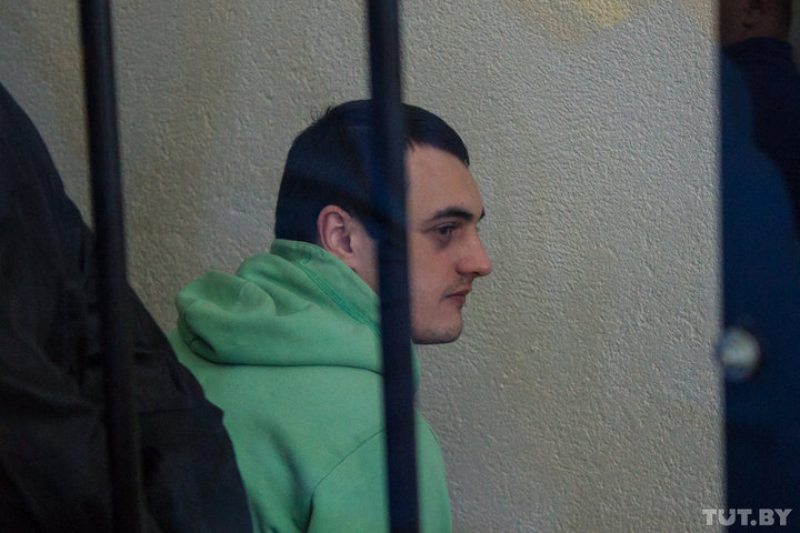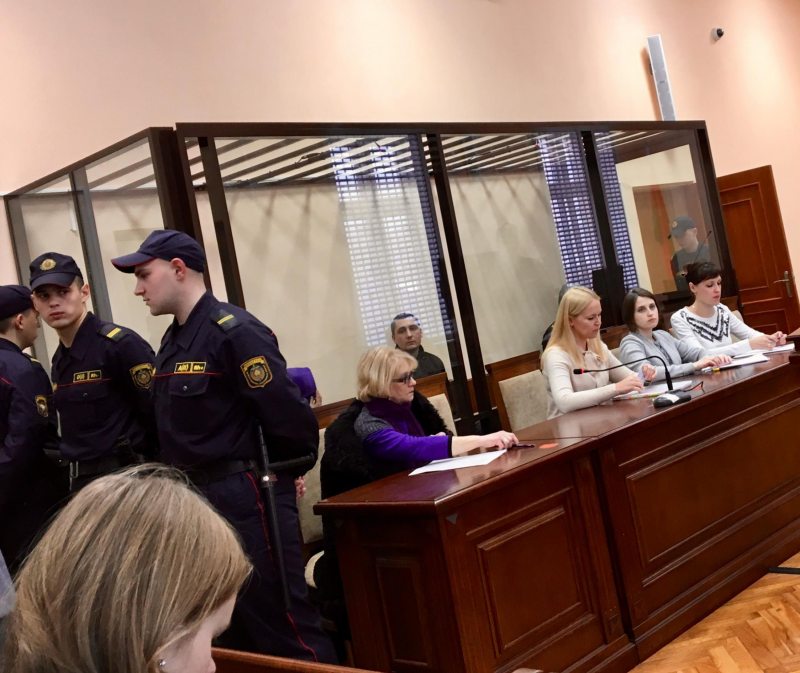The right to life was violated. The UN Human Rights Committee responded to the Belarusian authorities on Berazhny and Hershankou executed in 2018
The UN Human Rights Committee has published a decision on an individual appeal on behalf of Siamion Berazhny and Ihar Hershankou, who were sentenced to death and executed by the Belarusian authorities in 2018. Among the violations, the committee found a violation of the right to a fair trial, noted that no one can be arbitrarily deprived of life, and demanded that the Belarusian authorities pay appropriate compensation to the mothers of the punished.
Background
On July 21, 2017, Siamion Berazhny and Ihar Hershankou were sentenced to death by the Mahilioŭ Regional Court after being found guilty on several counts of murder, attempted murder, robbery, and fraud committed by an organized group. Berazhny and Hershankou appealed to the Supreme Court, as well as petitioned for a supervisory review to the Prosecutor General's Office and for a supervisory review to the Supreme Court, but all this was rejected. Their petitions for a presidential pardon were also rejected.
The UN Human Rights Committee took urgent interim measures: on June 29 and July 13, 2018, the Committee asked the Belarusian authorities not to carry out the death sentences of Berazhny and Hershankou before the committee considers an individual appeal on their behalf. However, on November 29, 2018, the Committee was informed that Berazhny and Hershankou had been executed. In this, the Committee saw a lack of cooperation on the part of the Belarusian authorities.
"The Committee observes that it is uncontested that the execution in question took place in total disregard of the request for interim measures of protection addressed to the State party [by the authorities of Belarus — note]," says the response of the UN Human Rights Committee. "State party committed a serious violation of its obligations under the Optional Protocol by executing the alleged victims before the Committee had concluded its consideration of the present communications... [therefore, the Belarusian authorities] have not fulfilled their obligations under article 1 of the Optional Protocol."
No one can be arbitrarily deprived of life
The authors of the appeal to the Committee on behalf of Hershankou and Berazhny were their mothers, represented by the coordinator of the campaign Human Rights Defenders against the death Penalty in Belarus Andrei Paluda. In their complaint, they pointed out that Hershankou and Berazhny were sentenced to death as a result of an unfair trial.
According to the Belarusian authorities, the punishment was based on the principle of "individualization of punishment, in the presence of circumstances aggravating the liability and the absence of circumstances mitigating it." And that the state "fully guaranteed the right to a fair and public hearing by a competent, independent, and impartial court."
The Committee decided that although the International Covenant on Civil and Political Rights allows for the imposition of the death penalty "for the most serious crimes", however, the violation of the guarantees of a fair trial laid down in article 14 of the Covenant in proceedings leading to the imposition of the death penalty makes the sentence arbitrary and violates article 6 of the Covenant: "The right to life is an inalienable right of every human being. This right is protected by law. No one can be arbitrarily deprived of life."

- Siamion Berazhny. Photo: tut.by
Why is it unjust?
Of the violated articles of the Covenant listed by the applicants and accepted by the Committee as admissible, the following appeared, besides the 6th.
- 9 (3) anyone arrested or detained on a criminal charge must be brought promptly before a judge or other officer authorized by law to exercise judicial power and has the right to a trial within a reasonable time or to release.
The applicants indicated that Berazhny and Hershankou were arrested on March 26, 2015, while a warrant for their arrest was issued by the Deputy Prosecutor of the Mahilioŭ region only on April 3, 2015. Finally, Berazhny and Hershankou were brought before a judge for the first time on November 9, 2016, that is, 580 days after their arrest.
To this, the Belarusian authorities replied that "the pre-trial detention of the authors [of the appeal] was carried out in accordance with the Criminal Procedure Code."
However, the Committee considered that, according to general comment No. 35 (2014), the prosecutor could not be considered as an official authorized by law to exercise judicial power within the meaning of article 9 (3) of the Covenant. And that Berazhny and Hershankou were not promptly brought before a judge or other official authorized by law to exercise judicial power, as required by article 9 (3). Thus, as the Committee concluded, the rights of Berazhny and Hershankou were violated.
- 14 (2) everyone accused of a criminal offence has the right to be presumed innocent until proven guilty in accordance with the law.
As the applicants indicated in their appeal to the Committee, Berazhny and Hershankou were held in metal cages and handcuffs during the trial in the Mahilioŭ Regional Court and the appeal hearing in the Supreme Court. They also had to wear prison uniforms with the words "prisoner sentenced to death" on the back. And during the trial, a number of media outlets broadcast photos and videos received from the investigative authorities and called Berazhny and Hershankou "guilty," which led to biased public opinion against them and problems finding lawyers willing to take on their criminal cases. In addition, the presiding judge of the Mahilioŭ Regional Court allowed the relatives of the victims to behave very aggressively towards them in the courtroom, shouting that they were murderers who should be sentenced to death. In addition, Berazhny and Hershankou were accompanied to the Supreme Court by six guards who forced them to walk in a humiliating and extremely uncomfortable position intended exclusively for those sentenced to death, that is, with their heads down to their knees.
The Belarusian authorities rejected the authors' claims that "the court of first instance was influenced by the public and the media and repeatedly committed actions indicating a biased attitude towards them, which would violate the presumption of innocence."
The Committee immediately took note of the statements of the authors of the appeal that the Belarusian authorities violated the presumption of innocence of Berazhny and Hershankou.
"Defendants should normally not be kept in cages during trials, or otherwise presented to the court in a manner indicating that they may be dangerous criminals," the Committee said in its decision.
The Committee's conclusion
The UN Human Rights Committee has decided that Belarus should pay the authors of the appeal proper monetary compensation for the death of their sons, as well as, if applicable, reimbursement of court costs incurred.
"The State party is also under an obligation to prevent similar violations in the future and, in the light of its obligations under the Optional Protocol, to cooperate in good faith with the Committee, particularly by complying with its requests for interim measures," the Committee said in its statement.
In addition, the Committee wishes to receive information from Belarus within 180 days on the measures taken to give effect to the Committee’s Views. Belarus is also invited to publish it and ensure its wide dissemination.
How does Belarus react?
Andrei Paluda, coordinator of the campaign Human Rights Defenders against the Death Penalty in Belarus, shared his opinion.
This is not the first time when the Belarusian authorities disregard the urgent interim measures of the Committee, that is, they shoot people before the committee considers an individual appeal from them. Why is this happening?
 Andrei Paluda: Indeed, this is not the first time — I do not know of a single case when the Belarusian authorities reacted to urgent measures and somehow suspended the execution of death sentences in Belarus. To answer the question why this is happening: unfortunately, it is a persistent practice that has been in Belarus all the time, at least while the campaign Human Rights Defenders against the Death Penalty in Belarus has been in operation.
Andrei Paluda: Indeed, this is not the first time — I do not know of a single case when the Belarusian authorities reacted to urgent measures and somehow suspended the execution of death sentences in Belarus. To answer the question why this is happening: unfortunately, it is a persistent practice that has been in Belarus all the time, at least while the campaign Human Rights Defenders against the Death Penalty in Belarus has been in operation.
Although the Belarusian authorities denounced the Optional Protocol to the ICCPR in February 2023, they still undertake to respond to appeals submitted before denunciation. Nevertheless, we see in this decision that the Committee draws the attention of the Belarusian authorities to the fact that Belarus "has not fulfilled its obligations under article 1 of the Optional Protocol. Can you comment on this?
If we are talking about the first article, it confirms that if a State party to the agreements joins the Covenant, then it must fulfill the duties that are imposed on it. Of course, in 2018 Belarus was a participant of the Covenant, and it had to fulfill its obligations, but it never fulfilled them. And not only was there no reaction to urgent measures, as we said above. For example, the Belarusian authorities have never reported decisions to the committee, including on other cases, not only on the issue of the death penalty


